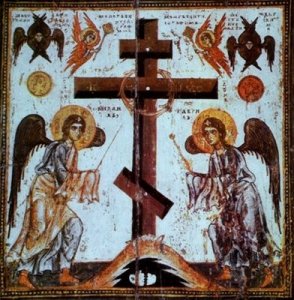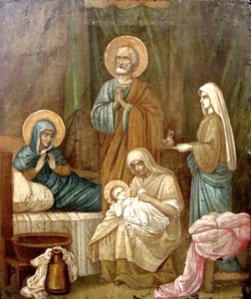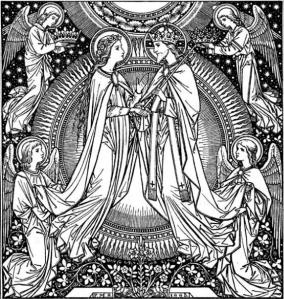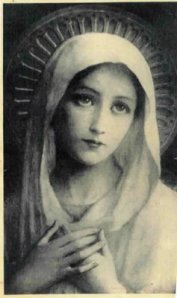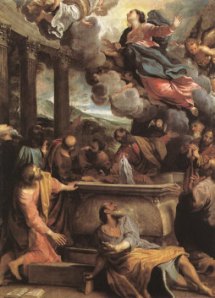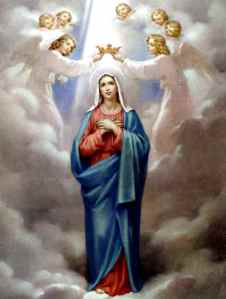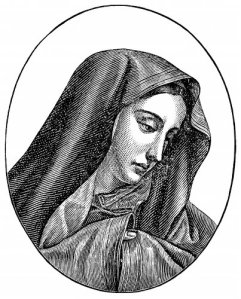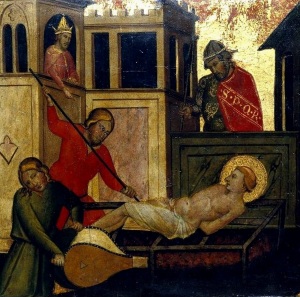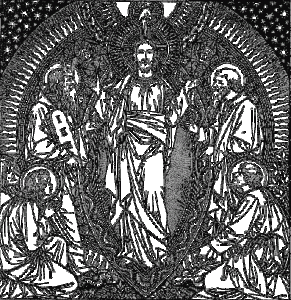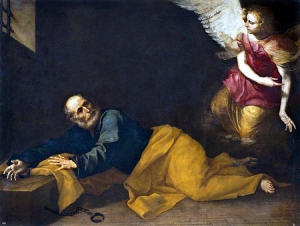Christe Supreme Dominator Alme
For the Eve of the Exaltation of the Cross
12th Century German Hymn (translation by Alan McDougall)
CHRIST in the highest, holy Lord of all things,
Conqueror and Sovereign, worshipful Redeemer,
Hear us in mercy, whom with price most wondrous
Thou hast redeemed.
Praise and thanksgiving jubilant and meetest
Offer we praying, sweetest King and kindest,
Whom by the pouring of thy blood thou savedst
On Rood victorious.
Once of old time the ancient foe had lured us
Unto his prison by a tree’s temptation,
But through the holy wood of Christ he waileth
Bound through the ages.
Now doth the serpent mourn his fangs, no longer
Able to harm, his poison reft for ever,
Now doth he weep, hell harrowed, and his people
Called to the heavens.
So through the cross, O Crucified, most precious,
So through the price unpriced of thy fair lifeblood,
Deign in thy mercy now to save thy servants
From death eternal.
Glory to God who reigneth in the highest,
Praise to the Son who reigns with him for ever,
Laud to the Holy Spirit coeternal,
Equal in Godhead.
How Christ is a Bundle of Myrrh
A sermon for Holy Cross Day by John Mason Neale.
“A bundle of Myrrh is my Well-Beloved unto me: He shall lie all night betwixt my breasts.”—Cant. I. 13.
This Song of Solomon is now, perhaps, less read than any other book of the Bible. And yet the day has been when holy men have written more about it, have thought more deeply upon it, have learnt more from it, than from any other part of the Old Testament. The reason is, that, unless we have deep love to our Lord, unless we can feel something of that which He has done for us, and of that which we owe Him, this Book is foolishness to us. It needs the especial assistance of the Holy Ghost to enable us to read it as it ought to be read. The verse you have heard is that which every Christian soul ought to be able to say to Christ. He is the Well-Beloved. And why it is that He is here called a Bundle of Myrrh it will be well for us to consider at this time, when we are called upon more especially to remember what He did and what He suffered for our sakes. For I am reminded to speak to you of His Cross by the very name of the day—Holy Cross Day—which is kept in memory of the recovery of the wood of the Cross from heathens that, six hundred years after our Lord’s Death, had carried it away.
Now Myrrh is chiefly remarkable for two things: its exceeding bitterness, and its power of healing wounds. By the Bundle, we are to understand all the different works of love which our Lord undertook for us, which cost Him so much—there is the bitterness; which wrought out our salvation—there is the healing. His weariness in His journeys. His labours in teaching, His watchfulness in praying, His temptations in fasting, His tears over sinners, His being plotted against by His enemies; the spitting, the buffeting, the scourging, the mockings and revilings, which He endured for our sakes. All these things are, as it were, a Bundle of Myrrh; each brought to Him so much bitterness, each brings to us so much strength and healing. But more than all the rest put together, is the exceeding bitterness of His Passion, which, in itself, combines all things necessary to salvation. Therefore S. Paul might well say, “I determined not to know anything among you, save Jesus Christ and Him crucified.” How should he wish to know more, when this is all knowledge in itself?
For Christ not only left us an example in what He did, but also in what He suffered. All that He had taught by word, He fulfilled in His most holy Passion in deed. See therefore what the only-begotten Son of God did, that He might gain many other sons to the Father, that He might gain many brethren to Himself. He came down from His kingdom, even heaven, alone; but He would not return thither alone. He redeemed us, Who was Himself sold; He exalted us, Who was Himself despised; He gave us blessings, Who was Himself loaded with curses; He bestowed on us life, Who was Himself condemned to death. And, being in the form of God, He took upon Him the form of a servant, that lie might redeem His servants; and being Himself the Tree of Life, He hung on the Tree of Death, namely, the Cross. And this is what we are called at this time to remember. “We all” says S. Paul, “behold as in a glass the glory of the Lord.” What? and is this His glory? Is it His glory to be a man of sorrows and acquainted with grief? To be reviled upon the Cross? To be forsaken by God the Father? To be mocked by them that pass by? To have no sorrow like His sorrow, no shame like His shame? Yes; this is the example that He set us. Therefore when we eat, every morsel which we put into our mouths should remind us of that morsel which He gave to Judas in the same night wherein lie was betrayed; when we drink, we should call to mind the vinegar and the gall which was given to Him in His thirst; when we lie down, we should remember the last hard bed on which He lay down, the cold and bare, and painful plank of the Cross; when we lay our head on the pillow, we should remember what sort of a pillow it was which He had for His most Sacred Head,—a crown of great sharp thorns; when we are quietly and easily-falling off to sleep, we should desire to call to mind that it was amidst revilings and mockiugs, in shame and agony, that He sank to His last sleep in the Cross; when He said, “Father, into Thy Hands I commend My Spirit;” and again when He said, “It is finished.”
And what that It was,—“It is finished?”—who shall venture to tell or to think?
And what do we owe Him for all this bundle of myrrh? for all this, blessing upon blessing, that He has wrought for us? We owe Him much because He created us. But how much more because He redeemed us! The creation cost Him only a word. “He spake the word, and they were made: He commanded, and they were created.” The redemption cost Him thirty-three years and more of labour and misery, and then death, even the death of the Cross. When He created us, He gave us ourselves, that is, our soul and body. When He redeemed us, He gave us Himself, that is, all His sufferings, all His merits, all His victories. We owe all that we can do for Him, because we are His by creation. But what then do we owe Him, because we are His by redemption? As a good man said of old,
For every drop of crimson dye
Thus shed to mate me lire,—
Oil wherefore, wherefore have not I
A thousand souls to give ?But He only asks that we give Him our love. Is that much? Is it possible—so we should have said, did we not by bitter experience know better—that we should not give it Him? Is it possible that, when we see His Cross, no longer the sign of disgrace and death, but of victory over the devil,—and the Crown of Thorns, which manifests Him the King of kings and Lord of lords,—and the Nails, dropping with His Blood,—is it possible that we should not give Him our whole hearts, our full love? You know best, each of you, whether you do or not.
All this shows how true is that saying of David, “The Loud careth for me.” The Father, that He might redeem us His servants, spared not His own Son; the Son, of His own free will, became obedient to death, even the death of the Cross: the Holy Ghost maketh intercession for us with groanings which cannot be uttered.
And now let us count up this Bundle of Myrrh, and see what it is, and what it does for us. Our Lord gave us His Flesh to be our food, His Blood to be our drink, His “Wounds to be our protection, His Cross to be our shield, His Bloody Sweat to be our medicine, His Nails to uphold us, His Crown of Thorns to ornament us, the water of His Side to cleanse us in Baptism. Therefore, the more dreadful His Passion appears, if we look at it with earthly eyes, the more sweet and precious we find it to be, when He gives us grace to see it as it is. The way in which Christ suffered shows that, if it had been necessary, or if it had been possible, He would have suffered ten thousand times as much.
There was an old belief that, if a murderer were brought into the presence of the dead body of him whom he had murdered, the wounds would begin to bleed afresh. We are Christ’s murderers, because it was for our sins that He died; and if we look at Him with the eye of Faith, we shall behold His Blood still flowing forth for our guilt, as freshly as on that day when He went up on Mount Calvary. He is as ready to cleanse us now as then. He ever liveth to make intercession for us, because His Wounds are ever open to plead for us. On this therefore we are now called to fix our eyes. “Looking unto Jesus, the Author and Finisher of our Faith, Who, for the joy that was set before Him, endured the Cross, despising the shame, and is set down at the Right Hand of the Throne of God.” And this is what David means, when he says, “Turn again then unto thy rest, O my soul.” This is our true repose. We have all rest in Him Who had all labour; we have all peace in Him “Who had all woe; we have all glory in Him Who had all shame.
To Him, with the Father and the Holy Ghost, be all honour and glory for ever and ever. Amen.
